Live Music & Heartland Connections
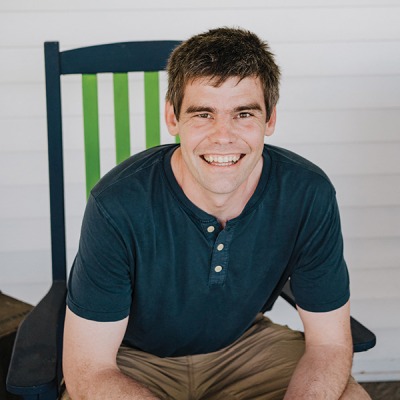
For John Taylor, music has always been a driving force. He played in the band in middle school growing up in Kewanee, Illinois, and later started bands with his friends as well. At age 17, he joined the military and served six years—the final 18 months on a deployment to Iraq. But when he came home in 2005, he found that post-traumatic stress disorder (PTSD) made the return to civilian life a significant challenge. As he struggled to relate to friends, family and peers, the end of a long-term relationship and the suicide of a fellow soldier made the transition even more difficult.
After spending countless hours seeking all matters of professional help, Taylor eventually found his recovery through live music. As he began attending concerts and playing music again, he discovered that sharing these experiences allowed him to once again relate to others—including his now-wife Stephanie, an old friend with whom he reconnected at a concert in Chicago.
After the birth of their first child, Taylor again found himself separated from the music community, so he started hosting concerts at his house in Cambridge, a small village of 2,160 residents in northwestern Illinois. The success of these house shows, coupled with a fortuitous grant opportunity, eventually led to a wildly popular concert series in nearby Galva, while his purchase of an old building in Bishop Hill brought to life the Bishop Hill Creative Commons—an arts center by day and concert venue by night.
Since 2014, Taylor has hosted more than 350 concerts—averaging one or two each week. Against all odds, and with the support of loyal volunteers, he has turned this stretch of the rural Midwest into an internationally known music destination, attracting artists from all over the world. Peoria Magazine sat down with Taylor to discuss his multi-faceted, years-long efforts to build community through the power of live music.
Congratulations on receiving the Levitt AMP [Your City] grant award for the third time! Can you provide some background on the Levitt Foundation?
The Mortimer & Mimi Levitt Foundation is a national creative placemaking funder dedicated to strengthening the social fabric of America through the power of free, live music. Currently, there are permanent Levitt pavilions in nine metro areas across the U.S., and 20 smaller cities are awarded the Levitt AMP [Your City] grant—a $25,000 matching grant program to put on a 10-week, free, family-friendly concert series in an underused public space. About 750,000 people annually attend these concerts. To date, the Levitt Foundation has awarded more than $2.3 million to 38 communities across America through the Levitt AMP grant program, including the 20 communities that will present the 2020 Levitt AMP Music Series.
How did you first become aware of this grant?
In 2017 I returned to Western Illinois University to finish my master’s degree, and a grant writing course caught my attention. The final project of this course was to find a grant opportunity and write an application for it. At the time I had been hosting concerts at our house for about three years and was seeing many people’s lives being positively impacted by them. I wanted to reach more people, but was beginning to outgrow the space in my home. So, I went to Google and typed in “music series grant” and one of the top results was a link to the Levitt Foundation.
As the class was wrapping up, it dawned on me that I had already done all the work to write the application—it would be silly to not go ahead and pursue it. But the grant could only be received by nonprofit organizations, so I began shopping around. After being turned down by several organizations, I pitched the idea to the Galva Arts Council, and a partnership was formed. In early 2018, 15 winners from across the U.S. were announced, and Galva was among the applications chosen.
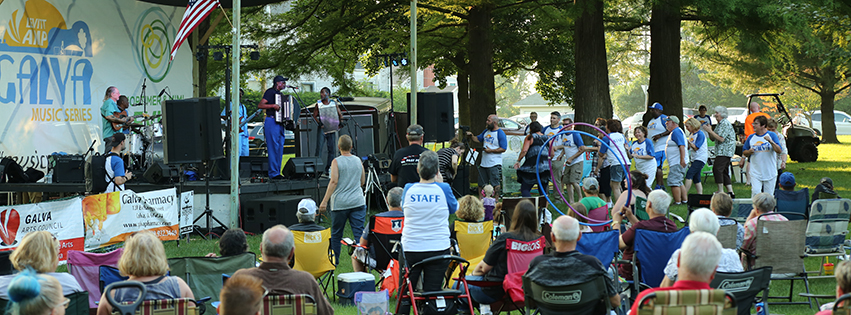
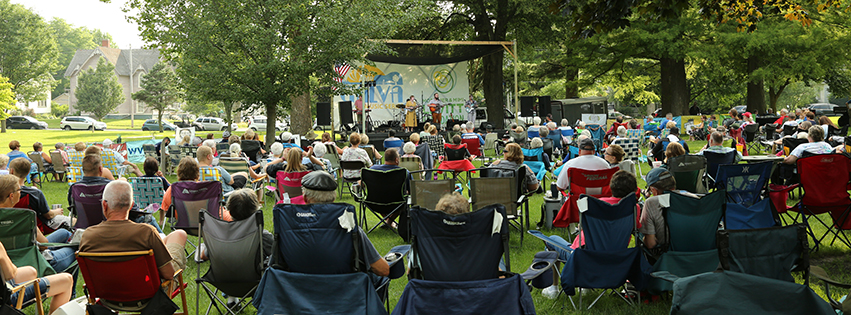
How do you use those grant dollars?
One of the unique things about the Levitt AMP Galva Music Series is that every role, from planning to execution, is done by volunteers. All of the other Levitt sites have some volunteers, but we are the only site with no paid staff. Because of this, we have focused our funds on: first, providing a diverse lineup of quality entertainment, and second, making investments to ensure the concert series can continue and grow year after year.
Each year, roughly $35,000 is spent on entertainment. The first year we invested about $20,000 in a sound system. Last year we invested about $15,000 in marketing assets to help recruit volunteers, raise funds and get people to the park. This year the plan is to save up a bit of a reserve so we can weather unforeseen expenses or fundraising shortfalls. Because the grant is year-to-year, there is a chance we may not get it at some point, and we want to be prepared to still put on a concert series.
It’s amazing that such a small town would receive this grant three years in a row. To what do you attribute your success?
I attribute the success of this program to our dedicated group of volunteers who step up to overcome whatever challenges come our way. The big thing with grants (or asking for funding from any source) is showing that you have a solid plan and a history of doing the things you say you’re going to do. I was very lucky to find a partner in the Galva Arts Council. This organization just celebrated its 30th anniversary, and because of those who came before me, there was already a culture of volunteerism in the area.
Tell us more about plans to build a permanent stage in Galva. How did that project come together?
After the first year of the Levitt concerts in Galva, we started thinking about potential challenges. One of the biggest was having a permanent stage. The first year we salvaged the remains of a stage which had been sitting in the elements, rotting away for some time. The second year we limped along with the temporary stage again, but started talks with the city about constructing a permanent stage at Wiley Park.
Last July, the city council approved a design and funding for the first phase of the stage. We planned to build it in phases because the funding was not there to complete it all at once. Completely unexpectedly, at the end of January, Jane Doss, whose family has a long history in the Galva area, came forward with a $100,000 donation which fully funded the project. An anonymous donor also contributed $10,000, and about $500 was chipped in from a fundraising event we held.
I am thrilled about this, not only for the Levitt series, but for the area as a whole. I think there are many possibilities for how the stage can be used and hope it will inspire others to take advantage of it.
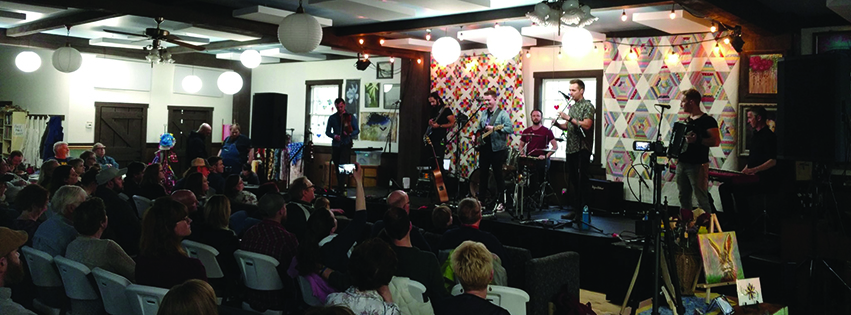
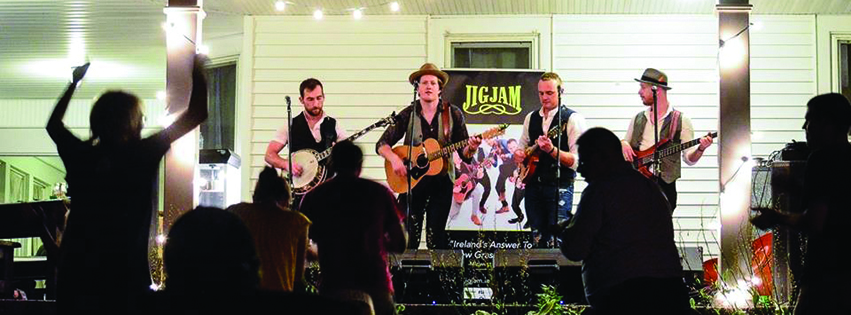
What is your role with the Bishop Hill Creative Commons?
I started the Bishop Hill Creative Commons with my friend and professional storyteller, Brian “Fox” Ellis, as a community gathering space focused on art. We both realized there are many local artists who do not have a place to share their talents and sell their work. This combined well my need for a larger space to hold concerts and the bigger picture of growing arts and culture in this area.
The Commons is not a gallery with static artwork. The artists run the shop, each working one or two days most months. This allows the public a rare opportunity to meet and interact with the artists who created the pieces for sale. They also host workshops and demonstrations, and then I host concerts at night.
You are still doing house concerts in Cambridge as well. What motivates you to continue hosting them?
For me, hosting house concerts is about seeing friends and building community. Through my struggles with PTSD and overcoming those challenges, I realized that on some level many of us feel separated from other groups of people. Differences in race, age, sex, income, religion, culture or experiences can become non-dividing issues through the power of live music. Music presented in an inclusive way, where all are welcome, can create opportunities for the most unlikely of interactions to happen. Even one seemingly insignificant shared experience can create a bridge to bring people together and increase tolerance and understanding of different points of view. I love being able to create these moments for others, and I love the experience of being present to hear the songs and stories of the performers live and in person.
Having played many nightmare gigs as a musician, I also knew that I could help touring musicians by providing them with food (we start every concert with a potluck dinner), a place to stay (we host the musicians at our home) and an attentive audience.
The motivation to continue comes from the lives I have seen impacted, mine included, through live music. I have made so many friends and met so many great people from all over the globe—and the connections keep growing. Especially with the concerts in Galva, which require a lot of volunteer help, the concerts have provided an opportunity for people to be involved in actively doing things to better their community. There are folks who have been stuck at home, physically disabled, for many years who have found a place where they feel like they belong and can make a difference. No matter what the situation, when someone comes to me offering to help, I always try to find some way they can be involved.
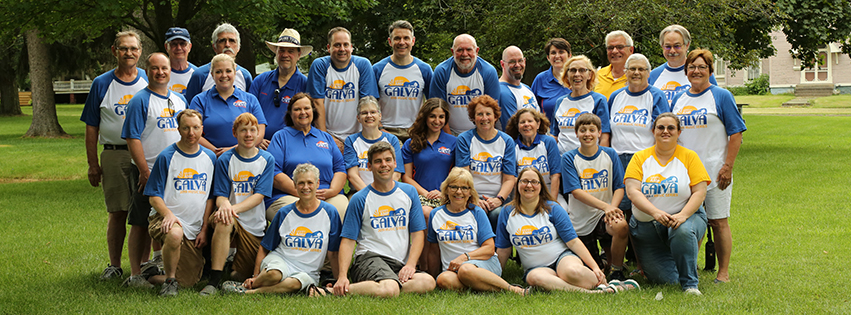
So, what is Heartland Connections then? Tell me more about its mission.
Heartland Connections was formed in late 2019 with a mission to “elevate the area socially, culturally, and economically through the presentation of live music.” This was an idea that developed over the course of the last two years. After I started the Levitt concerts and opened the venue in Bishop Hill, things began to snowball. I was hosting concerts at my house, in Bishop Hill, in Galva, and a variety of other places in the area.
In the process of doing all this work, I made connections with so many individuals, organizations and businesses… and the list keeps growing. I realized early on that partnerships were an important part of making this all happen. Not only do they allow everyone to do more than they could do alone, they create more opportunities for community involvement. The more buy-in and ownership from the community, the better, so I constantly engage with people to make them part of the movement.
At the end of the 2018 Levitt series, my friend Jason Bates became heavily involved in helping with the concerts. He was the one who really helped make Heartland Connections a reality, rather than just an idea. Jason and I realized that in order to have the impact that we want, we needed an umbrella structure to put it all under. This not only helps those living in this area be able to see and experience what is going on here, it also pushes the message of this area being a musical and cultural destination. As time has gone on, this has snowballed through word of mouth, and we have hosted many Grammy winners, Juno winners, and all sorts of artists from all over the globe.
It’s amazing how many organizations you are involved with! Tell us more about your various partnerships throughout the region.
Over the years, I have helped out with countless events and programs around the area. I am constantly trying to engage new people, encouraging them to take a chance on live music. More often than not, I find partnerships are mutually beneficial to everyone involved—and the community as a whole. 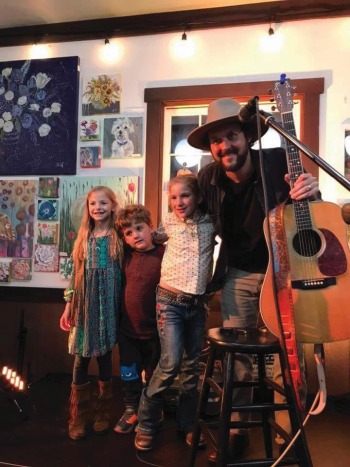 With the Levitt concerts in Galva, I have become a partner of Galva Arts Council, the City of Galva, and many businesses and organizations. In Cambridge, I serve on the village board and work with businesses and organizations in and around Cambridge. For years I have helped the Geneseo Chamber of Commerce with their annual music festival, and last year I was called in to help resurrect a bluegrass festival in Fulton, Illinois at Wierenga’s Heritage Canyon, which we are now in the middle of planning for the second year.
With the Levitt concerts in Galva, I have become a partner of Galva Arts Council, the City of Galva, and many businesses and organizations. In Cambridge, I serve on the village board and work with businesses and organizations in and around Cambridge. For years I have helped the Geneseo Chamber of Commerce with their annual music festival, and last year I was called in to help resurrect a bluegrass festival in Fulton, Illinois at Wierenga’s Heritage Canyon, which we are now in the middle of planning for the second year.
I have close ties with Big Picture Peoria, Quad City Arts, River Music Experience, Galesburg Community Foundation, Community Foundation of Central Illinois, Mercado on Fifth, Knox-Galesburg Symphony, and many other organizations. I have realized many of their projects and dreams are one or two steps away from being feasible, and usually there is another person, group, organization or business out there who could add the missing piece. A lot of what I do is try to make these connections, which is where the “Connections” part of Heartland Connections comes from.
At the end of the day, I have yet to meet anyone who doesn’t want to contribute to their community, but we often need encouragement and to have opportunities shown to us to take that leap. My hope is to inspire others to not only take the opportunities that I try to create, but also inspire others.
On a different note, you were recently involved in a documentary about interpreters from the Iraq War. Tell us more about No One Left Behind and how you got involved in that project.
I served in the military and spent the last year of my term in Iraq. Local interpreters played a very important role in everything we did. They were our only means of communicating with the people we encountered and also served as cultural advisors for us. I came home in 2005, and in 2007 one of the interpreters I worked with was able to flee Iraq and bring his family to the U.S.
Despite all this, it wasn’t until 2015 that I became aware of just how lucky this one interpreter was. Very unexpectedly, it was at this time that another interpreter I had worked with reached out to me asking for help. It came as a complete surprise. Due to the critical role these interpreters played, they were high-value targets of the insurgents and had a very short life expectancy. This interpreter, codenamed “Jaguar,” had applied for refugee status in 2011 and his application had not been processed. I immediately began contacting state representatives and quickly realized the system to protect these interpreters was badly broken. After about two years of trying everything I could think of, spending thousands of dollars of my own money in an attempt to bring this interpreter to safety, I was still unsuccessful.
About a year ago, a friend asked how my attempts to help the interpreters were going. As I was explaining the situation, another friend overheard the conversation and said he wanted to help. We got together and decided we would produce a short video, showing a bit from the lives of the two interpreters mentioned above, to raise awareness to the situation. I connected with Gary Metivier, multi-Emmy-winning and Edward R. Murrow award-winning journalist, through Jason Bates, who I originally met at an Honor Flight fundraiser. Gary was immediately interested and we got started filming.
I am still attempting to raise awareness to the situation. The more people I talk to, the more I realize the average person has no clue that these interpreters exist, the sacrifices they have made for our country, and the danger they face because of their service. There are still tens of thousands of interpreters who have been left behind and may never be able to flee. I ask others to contact their elected officials and demand change to protect our wartime allies. PM
Visit heartlandconnections.com or find Heartland Connections on Facebook to learn more about concerts and events in the west-central Illinois area.
- Log in to post comments

